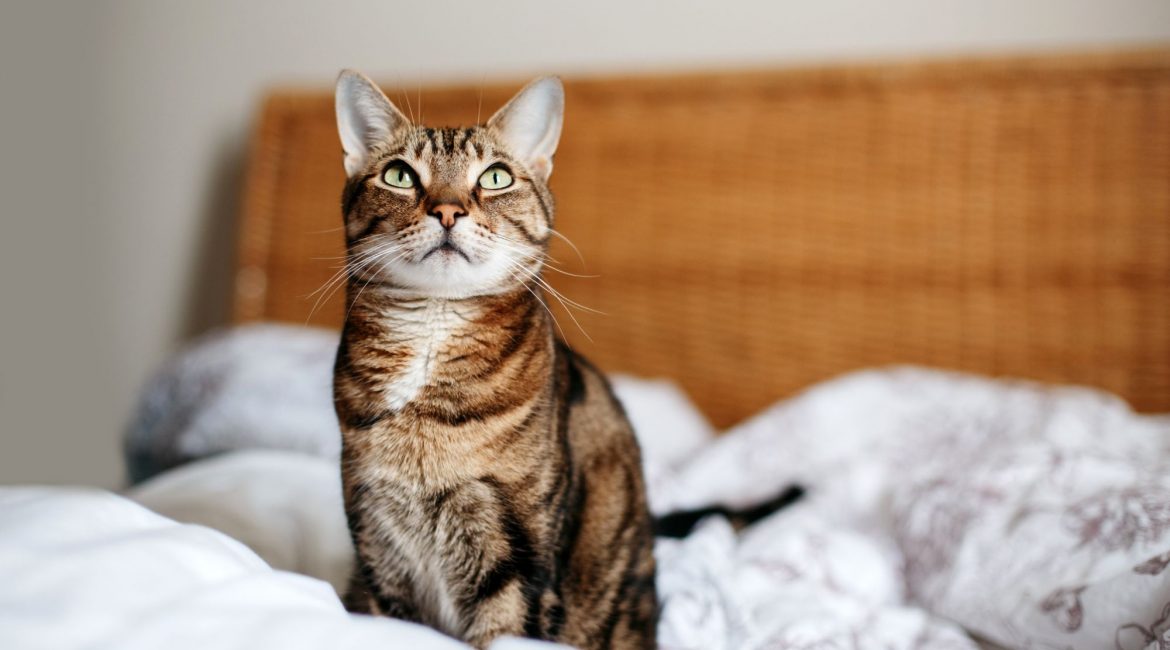Cat spraying can be highly frustrating as it leaves you with the entire house smelling of cat urine while you are worried about your cat acting this way. Fortunately, there are a few ways you can get your cat to stop spraying on your furniture and curtains.
Ready to talk about all things cat behaviour? Let’s get into it:
What exactly is meant by saying cat spraying?
This is when your cat backs himself up to a vertical surface with his tail erect and squirts some urine. His tail might quiver while spraying.
Regular urinating is when your cat squats to urinate in the litter box or on your furniture, floor or any other horizontal surface. Both female and male cats can spray and squat.
There are two different types of urine marking, namely:
- Spraying urine on vertical surfaces (like the side of your couch, walls or windows)
- Urinating on horizontal surfaces (like your bed, carpets or pillows)
Remember, your cat’s instinct will be to stake their claim by leaving their scent — everywhere. So while most cats will mark their territory by scratching or rubbing against furniture, others might choose to urinate.
Scent is one of the main ways in which cats communicate with one another. For example, when your cat comes home from the vet and smells of a foreign place, your other cats at home might give him a good sniffing over before this strange-smelling feline is accepted back into the family again.
So, what causes my cat to spray?
Cats will spray or urine mark as a way to communicate with others. The majority of cats who spray are not neutered. Sex hormones play a massive role in urine marking.
Cats spray due to territorial reasons, they might also feel threatened or anxious.
Perhaps there is a stray cat in your yard, which can result in your cat marking your windows and doors to defend his territory. Or if there is conflict between existing pets in your home.
Changes to your cat’s environment can also cause him to spray, such as rearranging his living space or moving to a new house.
Some cats might also target a new visitor in your home’s clothing or bedding.
So how do you stop your cat from spraying? Let’s take a look at seven simple steps:
1. Neuter or spay your cat
It’s important that you spay or neuter your cat, as sex hormones are a significant factor in scent marking.
If you have pet insurance, then these costs are covered in your plan.
2. Find out if there is an underlying medical issue
Visit your vet to ensure there is no serious medical issue resulting in your cat spraying.
Cats might spray for a number of issues, such as:
- diabetes
- urinary tract infection
- feline lower urinary tract disease
- kidney infection, or
- thyroid disease, or
- liver disease.
Your vet will then run lab tests to rule out any of these issues. So, be sure to have you fur baby covered with pet insurance.
Most of these tests will require a blood or urine sample. Sometimes, your vet might need to perform X-rays or an ultrasound.
If no physical problems are detected, your cat is spraying because of a behavioural issue.
3. Find out if there is any conflict in your home
The next step is to assess if your cat is experiencing stress due to an issue of conflict. Maybe your cat is being chased, tormented or bullied by another dog or cat in your home.
If this is the case, you need to address this issue with the help of a qualified professional who might recommend techniques such as temporary separation or training to improve the problem between your pets.
If a stray cat is coming into your yard, try limiting your cat’s outside view by installing temporary window blockers. If the cat belongs to a neighbour, communicate your concerns with them and see if you both can come up with a solution.
If the cat is feral, you can hire a cat trap from your local SPCA and catch the feral. You can then take the cat to your local SPCA or an animal rescue centre.
4. Find the spots your cat sprays on and clean them
It’s essential to clean all the areas where your cat might have sprayed. This is because if the smell remains, your cat will likely come back to mark it again.
If you are not sure where your cat might have sprayed, check the following places:
- entryways
- near his litter box
- vertical surfaces like chairs, your bed, the side of the couch, and
- windows.
You can get rid of the urine on your furniture by using a biological washing powder and hot water. First, wipe down the areas with the wet cloth that you dipped into the hot water and washing powder. You can then go in with a cat urine odour-eliminating spray.
Be sure not to use the spray near your cat’s litter box, as this can cause them to stop using that sport for urinating.
Important to note: Do not use cleaning products that contain ammonia or bleach, as these can amplify the scent of your cat’s urine, and encourage them to return and remark these spots.
5. Make the marked spot a happy place
If your cat has sprayed a specific area, it’s their way of showing other animals that it’s their territory. You can use this as a way to provide positive reinforcement. For example, clean the spot thoroughly and then when you give your cats a treat, give it to them near that spot or spend some time playing with them there.
This will show your cat that it is a safe place, and they can also mark it by rubbing on surrounding objects.
6. Close the blinds
Talk about avoiding the problem here, but in reality, some cats are just a lot more territorial than others. So, for example, if your cat sees a stray or the neighbour’s cat peaking at them through the window, they might feel the need to mark their territory.
Simply closing the blinds or curtains, especially in the evenings when you know other cats might be strolling through the garden, can help your cat feel more at ease. And you will not be left with cat urine being sprayed everywhere.
7. Change the type of litter
Cats are known to be fussy, so maybe your cat is spraying because he doesn’t like this litter anymore. You can try and change the litter to see if this will help with the issue, but it’s important to note that spraying might not be directly linked to your cat’s litter box issue.
We hope this has been helpful and can aid in your fur baby refraining from marking his or her territory in your home.
Yours in paws,
The Oneplan Pet Team




